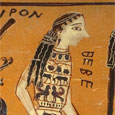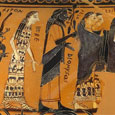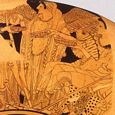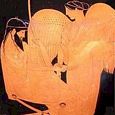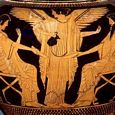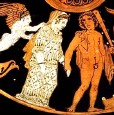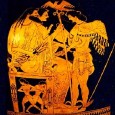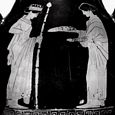HEBE
Greek Name
Ἡβη
Transliteration
Hêbê
Roman Name
Juventas
Translation
Youth (hêbê)
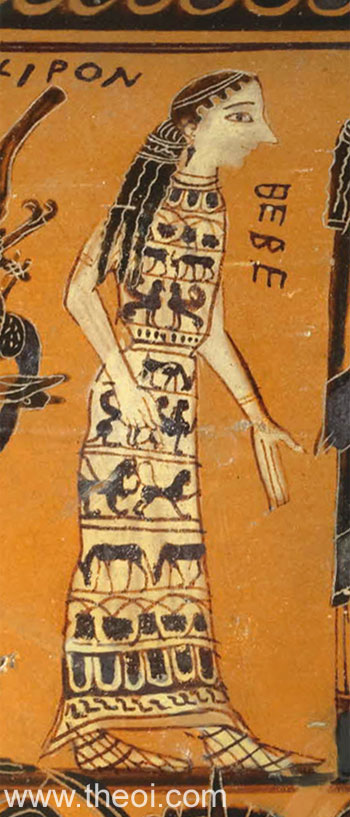
HEBE was the goddess of youth and the cupbearer of the gods who served ambrosia at the heavenly feast. She was also the patron goddess of the young bride and an attendant of the goddess Aphrodite.
Herakles (Heracles) received Hebe in marriage upon his ascension to Olympos, a wedding which reconciled the hero with Hebe's mother Hera.
In Greek vase painting Hebe was depicted either as the bride of Herakles, or the cupbearer of the gods, pouring ambrosia from a pitcher. Sometimes she had wings like the goddesses Iris and Nike.
Hebe's male counterpart was the boy Ganymedes and her opposite number was Geras (Old Age). She may have been equated with Selene's daughter Pandeia. Her Roman name was Juventas.
FAMILY OF HEBE
PARENTS
ZEUS & HERA (Hesiod Theogony 921, Homer Odyssey 11. 601, Pindar Isthmian Ode 4, Apollodorus 1.13, Pausanias 2.13.3, Aelian On Animals 17.46, Hyginus Preface)
OFFSPRING
ALEXIARES, ANIKETOS (by Herakles) (Apollodorus 2.158)
ENCYCLOPEDIA
HEBE (Hêbê), the personification of youth, is described as a daughter of Zeus and Hera (Apollod. i. 3. § 1.), and is, according to the Iliad (iv. 2), the minister of the gods, who fills their cups with nectar; she assists Hera in putting the horses to her chariot (v. 722); and she bathes and dresses her brother Ares (v. 905). According to the Odyssey (xi. 603; comp. Hes. Theog. 950), she was married to Heracles after his apotheosis. Later traditions, however, describe her as having become by Heracles the mother of two sons, Alexiares and Anticetus (Apollod. ii. 7. § 7), and as a divinity who had it in her power to make persons of an advanced age young again. (Ov. Met. ix. 400, &c.) She was worshipped at Athens, where she had an altar in the Cynosarges, near one of Heracles. (Paus. i. 19. § 3.) Under the name of the female Ganymedes (Ganymeda) or Dia, she was worshipped in a sacred grove at Sicyon and Phlius. (Paus. ii. 13. § 3; Strab. viii. p. 382.)
At Rome the goddess was worshipped under the corresponding name of Juventas, and that at a very early time, for her chapel on the Capitol existed before the temple of Jupiter was built there; and she, as well as Terminus, is said to have opposed the consecration of the temple of Jupiter. (Liv. v. 54.) Another temple of Juventas, in the Circus Maximus, was vowed by the consul M. Livius, after the defeat of Hasdrubal, in B. C. 207, and was consecrated 16 years afterwards. (Liv. xxxvi. 36 ; comp. xxi. 62; Dionys. iv. 15, where a temple of Juventas is mentioned as early as the reign of Servius Tullius; August. de Civ. Dei, iv. 23; Plin. H. N. xxix. 4, 14, xxxv. 36, 22.)
Source: Dictionary of Greek and Roman Biography and Mythology.
CLASSICAL LITERATURE QUOTES
PARENTAGE & BIRTH OF HEBE
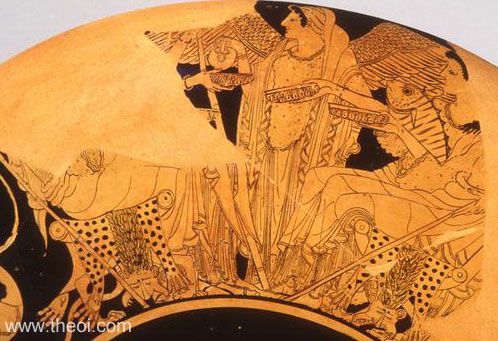
Hesiod, Theogony 921 ff (trans. Evelyn-White) (Greek epic C8th or C7th B.C.)
:
"Lastly, he [Zeus] made Hera his blooming wife: and she was joined in love with the king of gods and men,
and brought forth Hebe and Ares and Eileithyia."
Pseudo-Apollodorus, Bibliotheca 1. 13 (trans. Aldrich) (Greek mythographer C2nd A.D.)
:
"Zeus married Hera and fathered Hebe, Eileithyia."
Callimachus, Iambi Fragment 202 (trans. Trypanis) (Greek poet C3rd B.C.) :
"Mousa (Muse), I will sing for the little maid . . ((lacuna)) once when Hera was celebrating the feast of
the seventh day of her daughter's birth [Hebe], the gods sitting on Olympos (Olympus) quarrelled, who would
honour the child with the most beautiful gift . . ((lacuna)) Tritonis [Athena] brought many toys of cunning
workmanship shrewdly carved, and many came from the guardian of the Apian Isthmos (Isthmus) [Poseidon], toys
more precious than gold. The gods in amicable rivalry vied with one another in offering gifts. But you, Delian
Apollon . . you said the following ‘Phoibos (Phoebus), you must try your skilful art [music] which will
surpass the masterpieces of Hephaistos (Hephaestus).’"
Pausanias, Description of Greece 2. 13. 3 (trans. Jones) (Greek travelogue C2nd A.D.)
:
"Olen [legendary Greek poet], in his hymn to Hera, says that Hera was reared by the Horai (Horae, Seasons),
and that her children were Ares and Hebe."
Pseudo-Hyginus, Preface (trans. Grant) (Roman mythographer C2nd A.D.) :
"Again from Jove [Zeus] and Juno [Hera] [were born] : Juventus (Youth) [Hebe], Libertas (Freedom)
[Eileithyia]."
HEBE CUPBEARER OF THE GODS
Homer, Iliad 4. 1 ff (trans. Lattimore) (Greek epic C8th B.C.) :
"Now the gods at the side of Zeus were sitting in council over the golden floor, and among them the goddess
Hebe (Youth) poured them nectar as wine, while they in the golden drinking-cups drank to each other, gazing down
on the city of the Trojans."
Euphronius, Fragment (from Scholiast on Aristophanes) (trans. Campbell, Vol Greek
Lyric IV Bacchylides, Frag 41) :
"According to Euphronios (Euphronius), this is because Basileia (Princess) is a daughter of Zeus; and she
seems to look after business connected with immortality, the responsibility of Athena in Bakkhylides
(Bacchylides), where she intends to give immortality to Tydeus."
[N.B. Basileia "the Princess" is Hebe. As youth personified and the cup-bearer of the gods she was
naturally responsible for immortality.]
Pausanias, Description of Greece 2. 13. 3 (trans. Jones) (Greek travelogue C2nd A.D.)
:
"Hebe (Youth), whom Homer mentions in the duel between Menelaos (Menelaus) and Alexandros (Alexander)
[Paris], saying that she was the cup-bearer of the gods."
Philostratus the Elder, Imagines 2. 20 (trans. Fairbanks) (Greek rhetorician C3rd
A.D.) :
"Beautiful Hebe (Youth) . . . the youngest of the gods and the one most revered by them, since it is
through her that they also are young."
Cicero, De Natura Deorum 1. 40 (trans. Rackham) (Roman rhetorician C1st B.C.)
:
"What viands and beverages, what harmonies of music and flowers of various hue, what delights of touch and
smell will you assign to the gods, so as to keep them steeped in pleasure? The poets array banquets or nectar
and ambrosia, with Juventas (Youth) [Hebe] or Ganymede in attendance as cup-bearer."
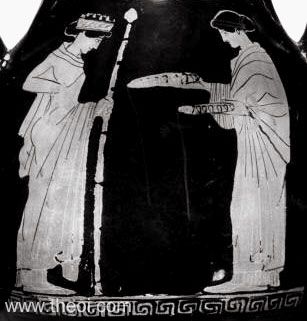
Statius, Silvae 3. 1. 27 (trans. Mozley) (Roman poetry C1st A.D.) :
"The throne of thy father Jove [Zeus] and the stars thy valour won thee are thy abode, and Hebe with robe
upgirt, more charming than the banished Phrygian lad [Ganymedes], hands thee the draught of blissful
nectar."
Nonnus, Dionysiaca 8. 93 ff (trans. Rouse) (Greek epic C5th A.D.) :
"I see Ganymedes come here to pour the wine, that long-haired cowdrover, first in Pergamos then domiciled
in Olympos (Olympus), usurping the untouched cup of heavenly Hebe."
Nonnus, Dionysiaca 14. 430 ff :
"Hebe come this way! Take up your pitcher, and bring your Trojan cupbearer who serves with cups the divine
company--let Ganymedes draw honeyed drops from this river and fill all the mixing-bowls of Zeus! . . . that
nectar of Olympos (Olympus) which they say is the drink of Zeus."
Nonnus, Dionysiaca 19. 158 ff :
"[The Seilen (Silen) Maron performs a mime :] He depicted with wordless art the cupbearer [Ganymedes] of
Kronides (Cronides) [Zeus], or pouring the dew divine to fill up the bowl, and the other immortals in company
ever enjoying cup after cup. His poet's theme was the sweet potion. Aye, he danced also the maiden Hebe herself
drawing the nectar; when he looked at the Satyroi (Satyrs), with voiceless hands he acted Ganymedes, or when he
saw the Bakkhante (Bacchante) women, he showed them goldenshoe Hebe in a picture having sense without
words."
Nonnus, Dionysiaca 25. 430 ff :
"Ganymedes walked among the stars to pour out their [the gods'] wine, the sweet nectar of Olympos
(Olympus), and there he was handing the cups which were the lot of virgin Hebe."
[N.B. By the "lot of virgin Hebe" he means it was her task before her marriage to Herakles
(Heracles).]
Nonnus, Dionysiaca 27. 241 ff :
"All the inhabitants of Olympos (Olympus) were sitting with Zeus in his godwelcoming hall, gathered in full
company on golden thrones. As they feasted, fairhair Ganymedes drew delicious nectar from the mixing-bowl and
carried it round. For then there was no noise of Akhaian (Achaean) war for the Trojans as once there was, that
Hebe with her lovely hair might again mix the cups, and the Trojan cupbearer might be kept apart from the
immortals, so as not to hear the fate of his country."
[N.B. During the Trojan War, Ganymedes became distressed, and so Zeus had Hebe temporarily resume her former
station as cup-bearer of the gods.]
Nonnus, Dionysiaca 33. 74 ff :
"[The godlings Eros and Hymenaios (Hymenaeus) were playing a game of cottabus in which wine was thrown from
cups at a mark :] [Eros] on the golden top of Olympos (Olympus), shooting the nectar-drops from a cup. Beside
him stood Hymenaios , his fair-haired playfellow in the dainty game . . . A large silver basin stood for their
game, and the shooting mark before them was a statue of Hebe shown in the middle pouring the wine. The umpire in
the game was Ganymedes, cupbearer of Kronides (Cronides) [Zeus], holding the garland."
HEBE HANDMAIDEN OF HERA
Hebe (Youth) and Eileithyia (Birth) were handmaidens of their mother Hera, goddess of marriage. Homer describes her performing various tasks assigned to the "princess" of the house in a typical Homeric palace (cf. Nausikaa (Nausicaa) and Hermione in the Odyssey.)
Homer, Iliad 5. 720 ff (trans. Lattimore) (Greek epic C8th B.C.) :
"Hera, high goddess, daughter of Kronos the mighty, went away to harness the gold-bridled horses. Then Hebe
in speed set about the chariot the curved wheels eight-spoked and brazen, with an axle or iron both ways. Golden
is the wheel's felly imperishable, and outside it is joined, a wonder to look upon, the brazen running-rim, and
the silver naves revolve on either side of the chariot, whereas the car itself is lashed fast with plaiting of
gold and silver, with double chariot rails that circle about it, and the pole of the chariot is of silver, to
whose extremity Hebe made fast the golden and splendid yoke, and fastened the harness, golden and splendid, and
underneath the yoke Hera, furious for hate and battle, led the swift-running horses."
Homer, Iliad 5. 905 ff :
"Hebe washed him [Ares returning from battle] clean and put delicate clothing upon him."
Pindar, Nemean Ode 10. 17 ff :
"Beside her mother [Hera], guardian of marriage, Hebe (Youth) fairest of all the goddesses."
Pausanias, Description of Greece 8. 9. 2 (trans. Jones) (Greek travelogue C2nd A.D.)
:
"Praxiteles made the images [in a temple of Hera at Mantinea]; Hera is sitting, while Athene and Hera's
daughter Hebe are standing by her side."
HEBE BRIDE OF HERACLES
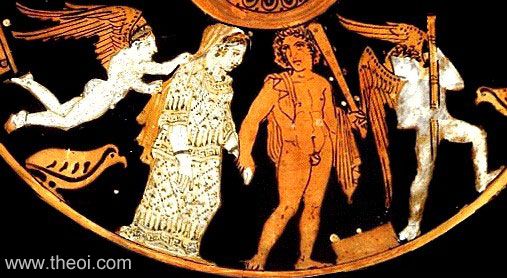
Hebe married Herakles (Heracles) after the hero ascended to Olympos as a god.
Homer, Odyssey 11. 601 ff (trans. Murray) (Greek epic C8th B.C.) :
"[Odysseus in the Underworld :] I marked the mighty Herakles (Heracles)--his phantom; for he himself among
the immortal gods takes his joy in the feast, and has to wife Hebe, of the fair ankles, daughter of great Zeus
and of Hera, of the golden sandals."
[N.B. This passage about Hebe in the Odyssey is a later interpolation.]
Hesiod, Theogony 950 ff (trans. Evelyn-White) (Greek epic C8th or C7th B.C.)
:
"And mighty Herakles (Heracles) . . . made Hebe the child of great Zeus and gold-shod Hera his shy wife in
snowy Olympos. Happy he! For he has finished his great works and lives amongst the dying gods, untroubled and
unaging all his days."
Homeric Hymn 15 to Heracles (trans. Evelyn-White) (Greek epic C7th - 4th B.C.)
:
"He [Herakles] lives happily in the glorious home of snowy Olympos, and has neat-ankled Hebe for his
wife."
Pindar, Olympian 6. 57 ff (trans. Conway) (Greek lyric C5th B.C.) :
"And when he [Herakles] won Youth's [Hebe's] joyous fruit, fair Hebe's gleaming crown."
[N.B. "Youth's joyous fruit" is immortality, and Hebe, youth personified, is his bride.]
Pindar, Nemean Ode 1. 61 ff :
"[After the infant Herakles strangled the serpents, his stepfather Tyndareos (Tyndareus) summoned the seer
Teiresias (TIresias) who prophesied the child's future :] Teiresias who then declared to him [Tyndareos] and all
the gathered host, what chance of fortunes Herakles should encounter; of monsters merciless how many on the dry
land, how many of the sea he should destroy; and of mankind, whom bent upon the path of pride and treachery he
should consign to an accursed death. This too he told : . . . He [Herakles] in peace for all time shall enjoy,
in the home of the blessed, leisure unbroken, a recompense most choice for his great deeds of toil; and winning
the lovely Hebe for his bride, and sharing his marriage feast beside Zeus, son of Kronos (Cronus), shall live to
grace his august law."
Pindar, Nemean Ode 10. 17 ff :
"[Herakles] who now upon Olympos dwelling, has to his wedded wife, beside her mother [Hera], guardian of
marriage, Hebe fairest of all the goddesses."
Pindar, Isthmian Ode 4. 73 ff :
"That hero [Herakles] it was, Alkmene's (Alcmena's) mighty son, who came at last to high Olympos; he who,
searching out all the far lands of earth and rock-walled stretches of the foaming seas, tempered the rough
straits for the seamen's sails. Now at the side of Zeus the Aigis-bearer he dwells, enjoying happiness most
fair, of the immortal gods a friend held in high honour, lord of the golden halls, husband of Hebe, son-in-law
of Hera."
Bacchylides, Fragment 41 (trans. Campbell, Vol. Greek Lyric IV) (C5th B.C.)
:
"Unless Zeus gives you Basileia (Princess) for your wife."
[I.e. To receive Basileia "the Princess" of heaven, is a metaphor for winning immortality.]
Pseudo-Apollodorus, Bibliotheca 2. 158 (trans. Aldrich) (Greek mythographer C2nd
A.D.) :
"[Herakles] achieved immortality, and when Hera's enmity changed to friendship, he married her daughter
Hebe, who bore him sons Alexiares and Aniketos (Anicetus)."
Diodorus Siculus, Library of History 4. 39. 3 (trans. Oldfather) (Greek historian
C1st B.C.) :
"Hera, the myths relate, after she had adopted Herakles in this fashion, joined him in marriage to Hebe,
regarding whom the poet [Homer] speaks in the Nekyia (Necyia) : ‘I saw the shade of
Herakles, but for himself he takes delight of feasts among the immortal gods and for his wife he hath the
shapely-ankled Hebe.’"
Pausanias, Description of Greece 1. 19. 3 (trans. Jones) (Greek travelogue C2nd A.D.)
:
"Hebe, who they think is the daughter of Zeus and wife to Herakles."
Pausanias, Description of Greece 2. 17. 5 - 6 :
"By this side of Hera [in her main Argive temple] stands what is said to be an image of Hebe fashioned by
Naukydes (Naucydes); it, too, is of ivory and gold . . . There is an altar upon which is wrought in relief the
fabled marriage of Hebe and Herakles."
Aelian, On Animals 17. 46 (trans. Scholfield) (Greek natural history C2nd A.D.)
:
"Herakles and his spouse [Hebe] whom poets celebrate as the daughter of Hera."
Philostratus the Elder, Imagines 2. 20 (trans. Fairbanks) (Greek rhetorician C3rd
A.D.) :
"Before long you [Herakles] will live with them in the sky, drinking, and embracing the beautiful Hebe
(Youth); for you are to marry the youngest of the gods and the one most revered by them, since it is through her
that they also are young."
Ovid, Metamorphoses 9. 396 ff (trans. Melville) (Roman epic C1st B.C. to C1st A.D.)
:
"[Iolaos (Iolaus) was rejuvenated by Hebe :] This guerdon was the gift of Hebe Junonia [daughter of
Juno-Hera], to gratify her husband's [Herakles'] wish."
Propertius, Elegies 1. 13 (trans. Goold) (Roman elegy C1st B.C.) :
"The passion of Hercules [Herakles], all afire for divine Hebe, tasted its first raptures after he had
burned on an Oetean pyre."
Valerius Flaccus, Argonautica 8. 230 ff (trans. Mozley) (Roman epic C1st A.D.)
:
"When Alcides [Herakles] has leisure at last to visit the heavenly banquet, and Hebe, child of Juno [Hera],
sustains his weary form."
Nonnus, Dionysiaca 35. 333 ff (trans. Rouse) (Greek epic C5th A.D.) :
"[After Dionysos was reconciled with Hera in heaven :] She [Hera] wished him in heaven as Hebe's
bridegroom, had not Zeus our Lord on High ordained that in days to come twelvelabour Herakles was fated to be
her husband."
HEBE & THE REJUVENATION OF IOLAUS
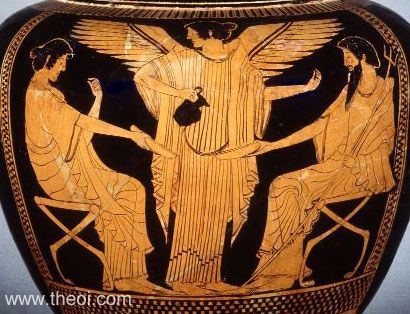
Ovid, Metamorphoses 9. 396 ff (trans. Melville) (Roman epic C1st B.C. to C1st A.D.)
:
"Alcmena [mother of Herakles (Heracles)] was arrested by a strange surprise. In the high doorway stood a
youth, almost a boy, his cheeks it seemed still downy, Iolaus, now restored in form and features to his early
prime. This guerdon was the gift of Hebe Junonia [daughter of Juno, i.e. of Hera], to gratify her husband's
[tHerakles'] wish.
She meant to swear not to bestow such gifts on any man thereafter, but was stopped by Themis. ‘Civil
war,’ she said, ‘embroils Thebae now and save by Jove's [Zeus'] might Capaneus shall not be
conquered . . . the prophet [Amphiaraus] yet alive shall see his ghost as earth gapes open; and his son
[Alkmaion (Alcmaeon)] parent on parent shall avenge, a deed of loving duty and a deed of crime. Distraught with
troubles, driven from his mind and home, the Eumenides [Erinyes, Furies] and his mother's [Eriphyle's] ghost
(umbrae) shall hound him till his consort shall demand the fatal golden necklace, and the sword of Phegeus drain
the blood of kith and kin. And then at last Callirhoe Acheloia [daughter of Akhelous], for her infant sons shall
beg those years [removed from Iolaos] from Jove [Zeus] on bended knee, to speed their vengeance for the victor's
death. And, at her suit, Jove [Zeus] shall foreclaim that gift of his stepdaughter [Hebe], and her sons shall be
transformed from their infancy.’
As Themis, who foreknew the future, spoke these prophecies, a rumbling argument arose in heaven, the gods all
grumbling why others should not be allowed to grant such gifts [rejuvenated youth]."
HEBE GODDESS OF YOUTH & BRIDES
Hebe was the goddess of youth and of the youthful bride. She was a companion of the wedding gods Hera, Aphrodite, the Kharites (Charites, Graces) and Harmonia (Marital Harmony).
Hesiod, Theogony 5 ff (trans. Evelyn-White) (Greek epic C8th or C7th B.C.)
:
"[The Mousai (Muses)] utter their song with lovely voice, praising Zeus the aigis-holder, and queenly Hera
. . . Aphrodite, and Hebe with the crown of gold, and fair Dione, Leto."
Homeric Hymn 3 to Pythian Apollo 186 ff (trans. Evelyn-White) (Greek epic C7th - 4th
B.C.) :
"[As Apollon plays the lyre and the Mousai (Muses) sing on Olympos :] Meanwhile the rich-tressed Kharites
(Charites, Graces) and cheerful Horai (Horae, Seasons) dance with Harmonia (Harmony) and Hebe (Youth) and
Aphrodite, daughter of Zeus, holding each other by the wrist."
Pindar, Nemean Ode 7. 1 ff (trans. Conway) (Greek lyric C5th B.C.) :
"Goddess of childbirth, Eileithyia, maid to the throne of the deep-thinking Moirai (Moirae, Fates), child
of all-powerful Hera, hear my song. For without thee should we see neither the light of day, nor know the kindly
dark, nor win the gift of Hebe (Youth), thy sister, the glorious limbs of youth."
Pindar, Nemean Ode 8. 1 ff :
"O sovereign Hebe (Youth), herald of Aphrodite and her sweet passions born of heaven."
Ovid, Metamorphoses 7. 241 ff (trans. Melville) (Roman epic C1st B.C. to C1st A.D.)
:
"[Medea uses her magic to restore the youth of Aeson, father of Iason (Jason) :] Two turf altars she built
[for the ritual], the right to Hecate, the left to Juventas (Youth) [Hebe], wreathed with the forest's mystic
foliage, and dug two trenches [to the gods of the Underworld] in the ground beside and then performed her rites
[applying her magic potions to the body of the man] . . . and Aeson woke and marvelled as he saw his prime
restored of forty years before."
Ovid, Fasti 6. 65 ff (trans.Boyle) (Roman poetry C1st B.C. to C1st A.D.) :
"Hercules' wife [Hebe] stood there; life's bloom shimmered in her face."
For MYTHS of Hebe as the goddess of youth see :
(1) Hebe Cupbearer of the Gods (serving the ambrosia of youth to the gods)
(2) Hebe & the Rejuvenation of Iolaus
CULT OF HEBE
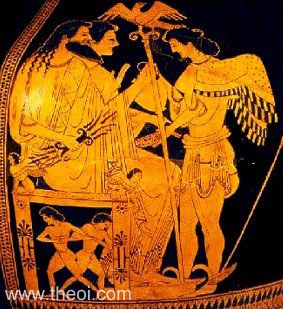
I. ATHENS Chief City of Attica (Attika) (Southern Greece)
Pausanias, Description of Greece 1. 19. 3 (trans. Jones) (Greek travelogue C2nd A.D.)
:
"There [at Athens] are altars of Herakles and Hebe, who they think is the daughter of Zeus and wife to
Herakles."
II. PHLIUS (PHLIOS) Town of Sicyon (Sikyonia) (Southern Greece)
Strabo, Geography 8. 6. 24 (trans. Jones) (Greek geographer C1st B.C. to C1st A.D.)
:
"In Phlios (Phlius) and Sikyon (Sicyon) the temple of Dia is held in honor; and Dia is their name for
Hebe."
Pausanias, Description of Greece 2. 12. 4 (trans. Jones) (Greek travelogue C2nd A.D.)
:
"A second hill on which the Phliasians [of Phlios in Argolis] have their citadel and their sanctuary of
Hebe."
Pausanias, Description of Greece 2. 13. 3 :
"On the Phliasian citadel [at Phlios in Argolis] is a grove of cypress trees and a sanctuary which from
ancient times has been held to be peculiarly holy. The earliest Phliasians named the goddess to whom the
sanctuary belongs Ganymeda; but later authorites call her Hebe, whom Homer mentions in the duel between Menelaos
(Menelaus) and Alexandros (Alexander), saying that she was the cup-bearer of the gods; and again he says, in the
descent of Odysseus to Haides, that she was the wife of Herakles. Olen [a legendary Greek poet], in his hymn to
Hera, says that Hera was reared by the Horai (Horae, Seasons), and that her children were Ares and Hebe. Of the
honours that the Phliasians pay to this goddess the greatest is the pardoning of suppliants. All those who seek
sanctuary here receive full forgiveness, and prisoners, when set free, dedicate their fetters on the trees in
the grove. The Phliasians also celebrate a yearly festival which they call Kissotomoi (Ivy-cutters).
There is no image, either kept in secret of openly displayed, and the reason for this is set forth in a sacred
legend of theirs though on the left as you go out is a temple of Hera with an image of Parian marble."
III. MANTINEA Town in Arcadia (Arkadia) (Southern Greece)
Pausanias, Description of Greece 8. 9. 2 :
"A temple of Hera [at Mantinea in Arkadia], Praxiteles made the images; Hera is sitting, while Athene and
Hera's daughter Hebe are standing by her side."
IV. UNKNOWN LOCATION
Aelian, On Animals 17. 46 (trans. Scholfield) (Greek natural history C2nd A.D.)
:
"Mnaseas in his work On Europe [Greek writer C3rd B.C.] says that there is a temple to Herakles
(Heracles) and to his spouse [Hebe] whom poets celebrate as the daughter of Hera. Now they say that in the
precincts of these temples a large number of tame birds are kept, adding that these birds are cockerels and
hens. They feed and consort together according to their sex, are fed at the public expense, and are consecrated
to the aforesaid gods. The hens feed in the temple of Hebe while their mates feed in the temple of Herakles. And
a never-failing channel of clear water flows between them. Now on the one hand not a single hen ever appears in
the temple of Herakles. On the other hand at the season of mating the cockerels fly across the channel and after
consorting with the hens return to their own quarters at the side of the god whom they serve, cleansed by the
water that separates the sexes. And so to begin with, as a natural result of this union eggs are laid; later on
when the hens have warmed them and hatched the chicks, the cockerels carry off the male birds to rear them,
while the hens make it their business to rear their daughters."
JUVENTAS & THE MONTH OF JUNE
Ovid, Fasti 6. 65 ff (trans.Boyle) (Roman poetry C1st B.C. to C1st A.D.) :
"Hercules' [Herakles'] wife [Juventas-Hebe] stood there; life's bloom shimmered in her face. ‘If my
mother [Juno-Hera] told me,’ she says, ‘to leave all heaven I would not stay against my mother's
will. So now I will not fight her over this time's name [i.e. in a dispute over which goddess gave her name to
the month of June], but coax and almost play petitioner. I'd rather keep my rights of possession by pleading,
and perhaps my case might win your favour. Mother owns the golden Capitol [of Rome] with her joint shrine, and
rightly holds the summit with Jove [Zeus]. But my whole glory comes from a month's origin; I am anxious for my
only honour. Does it matter, Roman, that you gave Hercules' wife the month's name, and posterity remembers? This
land owes me something, too, on my great husband's [Herakles'] account. He drove the captured cattle here, where
Cacus found no defence in his father's [Hephaistos' (Hephaestus')] gift of flame and dyed Aventine dirt with
blood. I pass to more recent times. Romulus divided the people by years into two sections: one was readier to
give counsel, one to fight, one age advises war, one wages it. So he decreed and marked the months with the same
token: June's for JUNiors, the seniors' month precedes.’
She spoke. They would have hotly disputed the claim and cloaked family piety with wrath : Concordia (Harmony)
[Harmonia] arrived [to settle the dispute]."
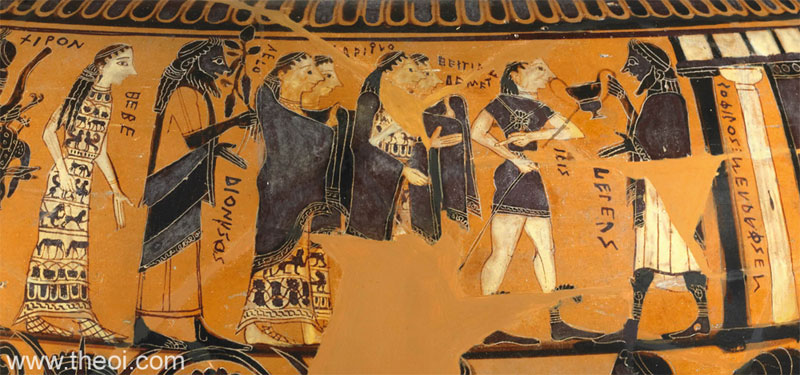
TITLES & EPITHETS
Greek Name
Βασιλεια
Δια
Γανυμηδα
Transliteration
Basileia
Dia
Ganymêda
Latin Spelling
Basilea
Dia
Ganymeda
Translation
Princess (basileia)
Daughter of Zeus (dia)
Gladdening Princess (ganumai, medeôn)
ANCIENT GREEK ART
SOURCES
GREEK
- Homer, The Iliad - Greek Epic C8th B.C.
- Homer, The Odyssey - Greek Epic C8th B.C.
- Hesiod, Theogony - Greek Epic C8th - 7th B.C.
- The Homeric Hymns - Greek Epic C8th - 4th B.C.
- Pindar, Odes - Greek Lyric C5th B.C.
- Greek Lyric IV Bacchylides, Fragments - Greek Lyric C5th B.C.
- Apollodorus, The Library - Greek Mythography C2nd A.D.
- Callimachus, Fragments - Greek Poetry C3rd B.C.
- Diodorus Siculus, The Library of History - Greek History C1st B.C.
- Strabo, Geography - Greek Geography C1st B.C. - C1st A.D.
- Pausanias, Description of Greece - Greek Travelogue C2nd A.D.
- Philostratus the Elder, Imagines - Greek Rhetoric C3rd A.D.
- Nonnus, Dionysiaca - Greek Epic C5th A.D.
ROMAN
- Hyginus, Fabulae - Latin Mythography C2nd A.D.
- Ovid, Metamorphoses - Latin Epic C1st B.C. - C1st A.D.
- Ovid, Fasti - Latin Poetry C1st B.C. - C1st A.D.
- Propertius, Elegies - Latin Elegy C1st B.C.
- Cicero, De Natura Deorum - Latin Rhetoric C1st B.C.
- Valerius Flaccus, The Argonautica - Latin Epic C1st A.D.
- Statius, Silvae - Latin Poetry C1st A.D.
BIBLIOGRAPHY
A complete bibliography of the translations quoted on this page.
